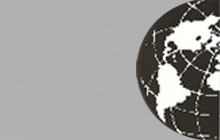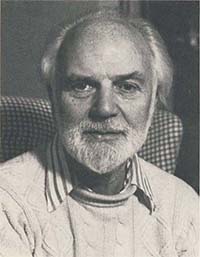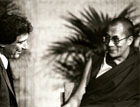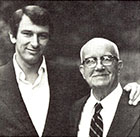
est and Taking It Easy -
by Douglas Harding
I want to be clear about what I've got out of est, so far. This will involve looking at what I had—where I was—when I first made contact with est a few months ago.
In fact, I'll have to go back a lot further than that. It was in 1943 that I saw who I really was. I certainly needed to. I'd become a very serious case of mistaken identity. I'd conned myself into believing that I really was somebody called Douglas Harding, a particular person milling around among hordes of other persons, one separate thing alongside or up against a lot of other separate things. It was hell. Then one day I noticed that I was that insignificant thing in appearance only, and that in reality I was an immense space in which everything was
going on, and on, and off, without affecting the space at all. Looked at from six feet away I was something, all right; from zero feet, nothing whatever. Nothing but the source and container of all things.
Still, of course, that somebody called Douglas hung around, making himself felt in countless ways. He continued to loom large and often in my space, clouding and distorting the other contents. Not that this worried me too much. I felt sure that seeing my true nature—the inside story of who I really was here—would in due course sort out what I appeared to be over there, without my having to tackle Douglas and his hang-ups directly, a huge task for which I felt unqualified anyway. After all, I'd got to the root of my problems: I'd solved the riddle of my identity. I'd uncovered my total perfection.
However, my Douglas-impersonation—that mysterious character who masquerades as ME —didn't in practice improve much as the years went by. Actually, there were times when he seemed to be getting worse instead of better. Well, I reflected, it's the human condition to be not okay. The very best thing I could do for him, for his friends, for all creatures, was to go on seeing steadily that I am forever where they all come from and go back to, and to go on devising new and more telling means of sharing this crucial seeing with as many people as possible.
This was how it was with me when, a few months back, I became involved with est. And this, basically, is how it is now. And I did get, and am still getting, a whole lot out of my est experience. What, then, has been added to or subtracted from what I already had? The rest of this article
doesn't really answer that question, but it makes a start.
What I got wasn't new light on who I am (which is the light itself) but on who I seem to be, on Douglas and what makes him tick.
For example, I've come to realize vividly how it is that I'm not simply the Source of the entire Universe, but also the source of that peculiar world which Douglas has found himself in, his special circumstances over the years. I set it all up that way. I created, as a sort of permanent loyal opposition party, a world that was mistaken and unenlightened and needing my treatment. I recognize now that this was the family pattern, into which I naturally fell. For, like my father, I was raised according to an exceedingly narrow and austere religious tradition. We regarded ourselves as an oasis of rightness in a desert of a world where all was wrong, wicked, hellbent. Then, at 21, I began exploring the desert. I found it richly, alarmingly fertile. So I detached myself abruptly from that tradition, and my family cut me off even more abruptly. I celebrated my freedom by experiencing my first play in the theatre, my first film, my first concert....
But was I free? I've come now to see how my life was in fact powered by the conviction that I was right, that I held the truth or enlightenment the world desperately needed and didn't want to know about. Indeed, after breaking away from my family, I continued to follow the family pattern in spite of myself. The content of my life changed utterly, the overall form remained.
I must at once add that I'm neither excusing nor deploring any of the patterns I've had in my life. Quite the contrary, I take full responsibility for them all and regret nothing. They weren't just used to good effect, they
proved indispensable. I set it all up—the whole cat's cradle —and by and large it worked. A job got done. A difference was made in the world.
But now I find myself completing these patterns — by becoming more aware of them, by re-experiencing how they tended to structure my life, and by sharing about them with you now. And, to the extent that they are completed, they disappear. Certainly at this time I find myself delighted to be free of the notion of having to set the world to rights.
The world is fine as it is. So I'm taking it easy, sailing with the wind instead of into it. You could say that I've retired.
And, paradoxically, I've done nothing of the sort. I'm getting on with the greatest work that can ever be done for the world; namely, to see steadily who I am without any particular reason and without doing anything special about it. For the seeing is the doing, and this seeing-doing is no personal or private experience. I can only see this as you, and for you, and on behalf of all. It's a cosmic happening and bears no date. No human, as such, was ever enlightened, for enlightenment is seeing that you aren't so much a human being as plain being. And no being, as such, was ever unenlightened, for Being is enlightenment. It follows that the enlightenment of one is the enlightenment of all (past, present, or future) and just can't be contained. So, far from retiring, I've taken on the toughest and most responsible of jobs—and the only one whose success can be 100 percent guaranteed.
My intention is nothing less than the world's enlightenment. I'm getting what I want, absolutely. And I owe to est the clarity of this statement. I look forward to being with you in America.
- Douglas Harding: The Graduate Review: February 1979 |





